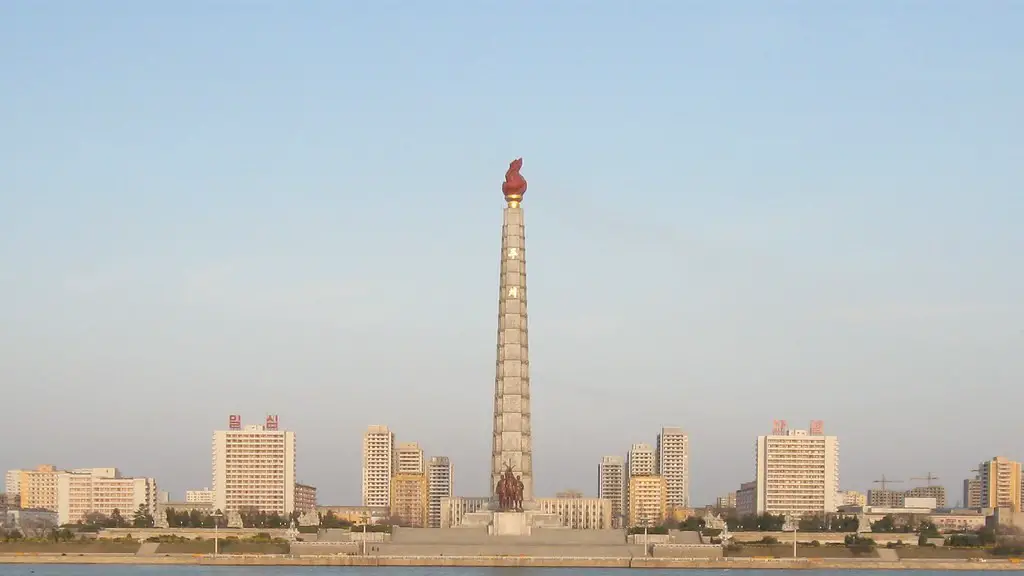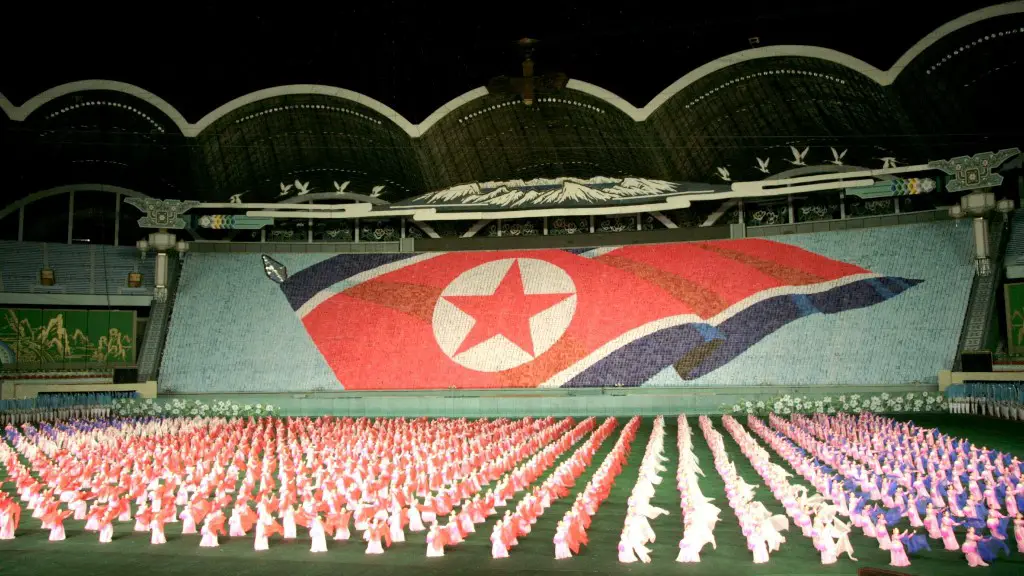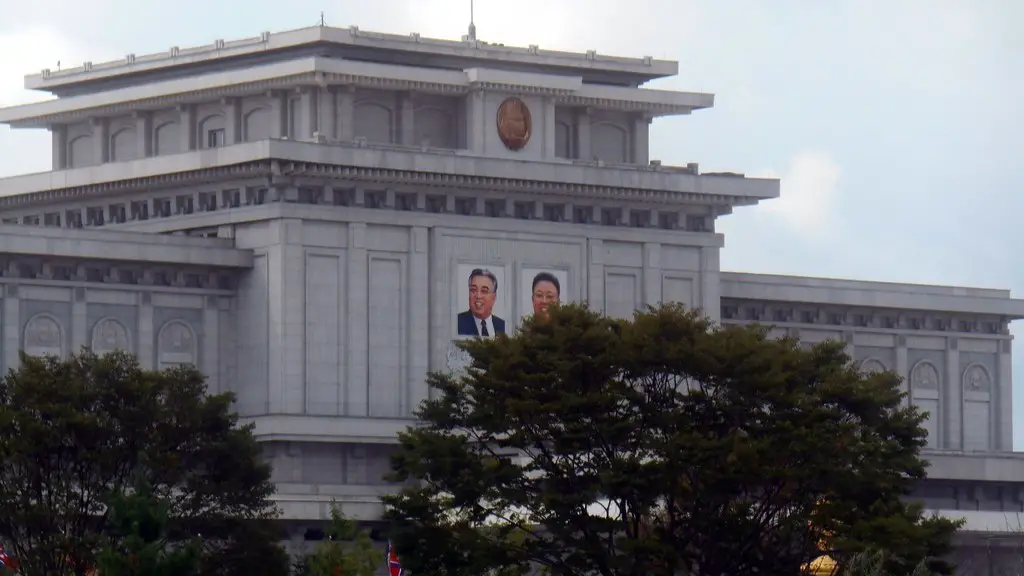America may not be at war with North Korea officially, but tensions have been growing steadily between the two countries over the past few decades. The Cold War that started after World War II is often considered to have ended in 1991, but the U.S. never actually signed a peace treaty with North Korea, officially ending the war. This means that technically, the two countries are still in a state of war.
In the aftermath of World War II and the Korean War, the United Nations signed an armistice, which brought an end to the fighting. This armistice was only intended to be a temporary measure, however, and it has remained in place since 1953. Even though the U.S. and North Korea have remained technically at war since then, there has not been any significant military conflict between the two countries.
The current state of tension between North Korea and the U.S. has been fueled by North Korea’s nuclear ambitions and its development of ballistic missile technology. The U.S. has long been critical of North Korea’s nuclear program, and has imposed punishing economic sanctions in an effort to dissuade the North Korean regime from pursuing its nuclear ambitions. For its part, North Korea has declined to abandon its nuclear program, despite the threat of further sanctions.
The situation on the Korean peninsula has become increasingly heated in recent years, with North Korea responding to U.S. sanctions by conducting a series of provocations, including nuclear and missile tests. This has led to increasingly hostile rhetoric from both sides, with President Trump warning that the U.S. would respond with “fire and fury” if threatened. In response, the North Korean regime threatened to fire missiles at the U.S. territory of Guam.
The rhetoric between the two sides has cooled in recent months, however, as both sides have made gestures toward talks and negotiations. In April 2018, North and South Korea declared that they had agreed to end the state of war between them, raising hopes of a more peaceful future on the Korean peninsula. President Trump has also expressed openness to talks with North Korea, though there have yet to be any concrete results from these negotiations.
Experts believe that the only way for the U.S. and North Korea to finally end their unresolved wartime status is for the two sides to sign a peace treaty. In the current circumstances, however, this seems unlikely. Both sides have dug in their heels and appear unwilling to compromise. In the meantime, the two countries remain technically at war, and the situation on the Korean peninsula remains tense and unstable.
Military Threats
The looming threat of military conflict between North Korea and the United States has been a major source of concern in recent years. North Korea has steadily been developing its nuclear and ballistic missile programs, and has repeatedly issued threats of nuclear retaliation if attacked. This has raised the possibility of a military conflict between the two countries, a prospect that has drawn criticism from many who are fearful of a devastating conflict on the Korean peninsula.
U.S. military forces have been present in South Korea since the end of the Korean War, and are a key factor in maintaining stability on the Korean peninsula. The U.S. also has a number of military bases in the region that could potentially be used in case of an armed conflict with North Korea. For its part, North Korea has a sizable military and has deployed a substantial number of forces along its border with South Korea.
The presence of these forces has led to a heightened state of alert on both sides of the Korean border. U.S. forces regularly conduct drills in the region, and North Korea has responded in kind. In recent years, the two sides have traded threats of military action, with North Korea issuing periodic warnings and exercises that have further increased tensions. This has raised fears of a potential military conflict between the two sides, and has led to calls for more peaceful negotiations.
The International Community
The international community has been largely sympathetic to the plight of the Korean people and has expressed concern about the situation on the peninsula. The U.N. Security Council has issued numerous statements calling for peace and dialogue between North Korea and the United States, and has made efforts to broker negotiations between the two sides. The United States and its allies have also imposed economic sanctions on North Korea in an attempt to pressure the regime into abandoning its nuclear program.
The international community has also expressed its concern about the human rights situation in North Korea. A number of organizations, including Amnesty International and Human Rights Watch, have highlighted the gross violations of human rights in the country, and have called for the regime to respect its citizens’ basic rights. U.N. officials have also expressed concern about the situation, and have urged the North Korean government to take steps to improve the situation.
The international community has also called for direct talks between North Korea and the United States. Many have expressed hope that the two sides can reach an agreement to end the state of war between them and find a peaceful resolution to the current crisis. However, despite these efforts, the situation on the Korean peninsula remains tense and unstable.
Economic Impact
The current tensions between North Korea and the United States have also had a negative economic impact on both countries. In North Korea, the sanctions imposed by the United States and its allies have had a crippling effect on the economy, and have led to a further deterioration of the already dire humanitarian situation. In addition, the dramatic decline in trade with South Korea has had a significant effect on the North Korean economy.
The United States has also been affected by the economic fallout from the situation on the Korean peninsula. The Trump Administration has imposed tariffs on Chinese goods in response to the North Korean threat, and this has led to a trade war between the two countries. This has had ripple effects in the U.S. economy, and has hurt some sectors, such as agriculture, that were heavily dependent on Chinese imports. The uncertainty of the situation has also dampened investor confidence, leading to a decline in the stock market.
The economic toll of the conflict on the Korean peninsula has been immense, and has had a significant impact on both North Korea and the United States. This has further raised the stakes in the conflict, and has made reaching a negotiated settlement all the more difficult.
Potential Solutions
In the face of mounting tensions between North Korea and the United States, there has been a push for new approaches to resolving the crisis. The international community has called for diplomacy, and the U.S. and North Korea have held several rounds of talks in recent months. However, these efforts have so far failed to lead to any tangible progress, and have been largely unsuccessful.
Increasingly, many experts have suggested that the only way forward is to take a more cooperative approach, and to pursue negotiations that lead to a more peaceful resolution of the conflict. This could involve the U.S. ceasing its punitive economic sanctions on North Korea and instead pursuing engagement and dialogue with the regime. Such an approach could be beneficial to both sides, and would help to de-escalate tensions and reduce the potential for a devastating conflict on the Korean peninsula.
Proposals for a peace treaty between the U.S. and North Korea have also been suggested as a potential solution. A treaty would provide a legal basis for ending the Korean War and would pave the way for diplomatic relations between the two countries. This could lead to new opportunities for reconciliation and cooperation, and would help to bring the long-running conflict to an end.
International Support
The international community has expressed its willingness to support peace negotiations between North Korea and the United States. Nations such as China and Russia have offered to broker talks between the two countries, while the United Nations has also voiced its support for negotiations. Moreover, a number of countries have offered to provide economic assistance to North Korea if it agrees to abandon its nuclear ambitions.
The potential benefits of a peaceful resolution to the conflict on the Korean peninsula have been widely discussed. The easing of tensions between the United States and North Korea could open up opportunities for greater economic and social integration between North and South Korea, as well as provide a much-needed boost to the region’s economy. It could also help to create a more secure and stable environment in the region.
The United States and North Korea remain technically at war, and there is no guarantee that the two sides will be able to reach a negotiated settlement. However, the willingness of the international community to support peace talks between the two countries suggests that there may yet be hope for a deal that could lead to a formal end to the state of war between the two countries.
Role of the US
The United States has long been a key player in the Korean peninsula, and it has an important role to play in resolving the crisis. The U.S. has a strong presence in the region, and its influence can shape the direction of the conflict. As such, it is important that the U.S. takes a proactive role in finding a peaceful resolution to the conflict.
The U.S. has taken a more conciliatory approach in recent months, with President Trump engaging in talks with the North Korean leader. In addition, the Trump administration has eased some of the economic sanctions against North Korea, raising hopes of a possible thaw in relations between the two countries. This newfound willingness to negotiate has been welcomed by many in the international community, and has raised hopes that the two sides can find a peaceful solution to their differences.
Ultimately, the U.S. must work in concert with the international community to find a way to resolve the ongoing conflict on the Korean peninsula. The U.S. should take a leadership role in finding peaceful solutions to this long-standing crisis, and must be committed to forging a path towards a lasting peace for the Korean people.
Conclusion
It has been more than six decades since the Korean War ended in an armistice, but the U.S. and North Korea remain technically at war. The situation on the peninsula has been volatile in recent years, and the international community has looked on with concern as tensions between the two countries have risen to alarming levels.
The U.S. and North Korea have engaged in talks in recent months, and there have been signs of a possible thaw in relations between the two sides. However, the path to peace remains uncertain, and the two sides have yet to find a way to end the state of war between them. The U.S. must continue to work with the international community to reach a peaceful resolution to this long-running conflict.





